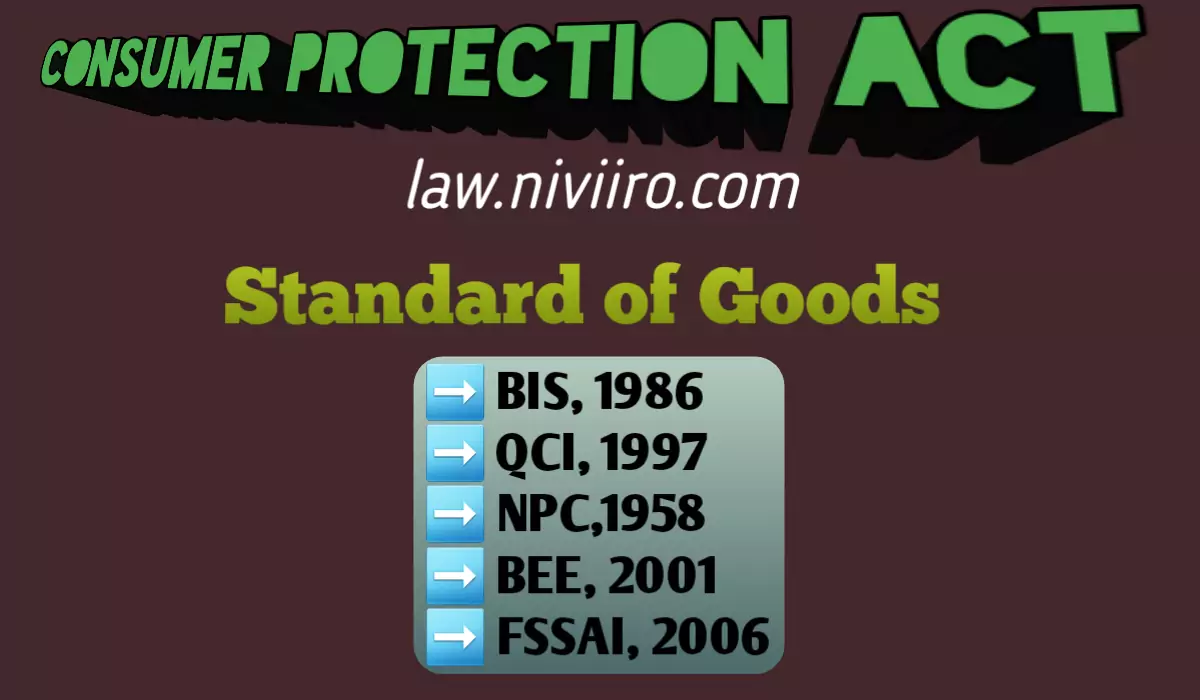Standard of Goods : The CPA attempts to protect consumers’ interests by ensuring that products and services satisfy specified quality, purity, quantity, and potency requirements. Notified bodies, such as the Bureau of Indian Standards (BIS), Food Safety and Standards Authority of India (FSSAI), and Drug Controller General of India (DCGI), play an important role in ensuring that these requirements are met through product testing, inspection, and certification. These organisations and their certifications can help consumers make wise decisions and ensure that the products they purchase are safe and of high quality.
Standard of quality, purity, quantity and potency
1. BIS (Bureau of Indian standard, 1986) –
The Bureau of Indian Standards is an organisation established by the CPA, 1986 to enforce quality and quantity standards for a variety of goods and services.
- Bureau of Indian standard is the apex regulator of standardization and quality certification regarding goods. E.g. packaged drinking water, LPG cylinders, etc.
- BIS is in charge of the formulation of Indian Standards (IS) for products, processes, and services to ensure their safety, reliability, and quality. It allows the manufacturer to use Indian Standard Institute (ISI) Mark on their goods. E.g. Helmet, cooker etc.
- It also has separate hallmark, license system for gold and silver jewellery.
- In case of non-compliance with the prescribed standards, consumers can file a complaint with BIS or seek legal remedies under the provisions of the CPA.
2. QCI (Quality council of India, 1997) –
The Quality Council of India is a non-governmental organisation under the Department for Promotion of Industry and Internal Trade (DPIIT) that promotes quality standards in several sectors, including healthcare, education, and environment.
- Quality council of India is a nonprofit society. It is registered under society’s registration with the funding from commerce ministry, federation of Indian chamber of commerce and industry, associated chambers of commerce and industry (ASSOCHAM).
- The QCI’s responsibilities include developing and promoting quantity control standards, providing training and certification programmes to manufacturers and service providers, and conducting audits and inspections to assure quantity standard compliance.
- QCI helps the industries to adopt to quality standard like ISI, ISO, OHSAS.
- QCI’s certifications ensure that the purchased product meet the prescribed quantity standards. QCI provides certificate of 0 defects to MSME industries.
3. NPC (National productivity council of India, 1958) –
- National productivity council of India, 1958 is an autonomous body setup under DPIIT (Department for promotion of Industry and Internal Trade), Ministry of Commerce and Industry, Government of India.
- The NPC promotes quality control and standardisation of products and services to guarantee that they meet minimal requirements.
- The NPC’s goal is to research, share and utilise knowledge and experience in productivity to encourage consciousness and development in productivity. It provides research and consultancy services for industrial engineering, agriculture business, quality management, human resources management, etc. to companies.
- NPC represents India and Asian productivity organization (APO) headquarters at Tokyo, Japan.
4. BEE (Bureau of energy efficiency, 2001-02) –
- The Bureau of Energy Efficiency (BEE) was set up as a statutory body under the Ministry of Power in March 2002, under the provisions of India’s Energy Conservation Act 2001.
- BEE is in charge of setting up standards and star ratings for various appliances in order to define energy efficiency, as well as enabling the implementation of energy conservation programmes.
- BEE’S energy ‘Star labeling’ logos help consumers to decide which electronic appliance is more energy efficient than other brands. This labeling compulsory for air conditioners, refrigerator, tubelight, colour TV, electric geyser, inverter, LED lamps etc. This labeling is voluntary for other appliances like computer, LPG stove, ceiling fan etc.
5. FSSAI (Food safety and standard Authority of India, 2006) –
- The Food Safety and Standards Authority of India (FSSAI) is a body that has been established under the Food Safety and Standards Act, 2006.
- FSSAI lays down scientific standard for food manufacturer, storage, distribution, sale and import in India.
- FSSAI Chairman may be a non-bureaucrat, food scientific.
- FSSAI act repealed previous contract act like prevention of food adulteration, 1954 and other laws of fruits, meat, edible oil or milk product etc.
Before food goods are supplied to customers, the FSSAI guarantees that they fulfills the quality requirements. It also oversees food business regulation in India to verify compliance with these requirements.
Related Post | Standard of Goods
standard of goods ?
(a) BIS (Bureau of Indian standard, 1986)
(b) QCI (Quality council of India, 1997)
(c) NPC (National productivity council of India, 1958)
(d) BEE (Bureau of energy efficiency, 2001-02)
(e) FSSAI (Food safety and standard Authority of India, 2006)
Reference Books | Standard of Goods
- Consumer Protection Act: A Commentary by G. B. Reddy
- Commentary on the Consumer Protection Act by J. N. Barowalia
- Consumer Protection (Law & Practice) by V. K. Agarwal

















